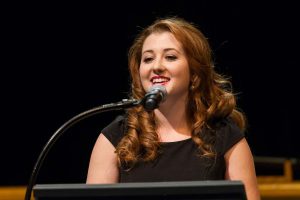‘The Airport Effect’

In high school, I remember being so focused on becoming successful that I wanted to skip college altogether. I wanted to go straight on to law school so that I could start my life as an attorney. I was in quite a hurry. So much so that I once compared college to a long airport layover. You don’t want to be there, you’re probably in the middle of nowhere surrounded by a slew of strangers who are all too loud, or too offensive, or who are sniffling and sneezing and probably infectious and you’re only interested in getting to your final destination. I call this “the airport effect”, which in terminals and train stations is quite normal. If my experience demonstrates anything though, it is that this airport effect has permeated our society’s educational system and I fear it has permeated other sacred spaces as well.
Back in high school, we lived under an enormous cloud of pressure, begging us on to be successful. So when prompted we could tell you our five-year plan, our ten-year plan, and even our backup plan if you were interested. When picking classes many of us focused on our potential grade by choosing, not whichever class seemed most interesting, but by choosing whichever teacher we had heard habitually gave out better grades. We regurgitated material, rather than digesting it. Extra-curriculars became medals of achievement. Leadership became a show. It is not pretty to acknowledge that this happens but it is necessary to do so.
And we didn’t leave this mentality at the gates of Wake Forest when entering. This is the baggage we brought to the terminal. The problem is it’s heavy baggage and when left unchecked, it invariably affects our quality of life and well-being. When we make success this large, far-off destination it all too often becomes an unachievable and unappeasable monster. And so the story goes, a story with which are all well acquainted: we toil away, day in and day out, and the blessings we accumulate seem like not enough, and we compare our things to our neighbor’s things, and we feel strife over stuff, and we feel inadequate like we are not enough. But we are. Which brings me to my far more optimistic point, that we can do something about it.
We find ourselves in a rather unique layover terminal called Wake Forest, which has given us the opportunity to challenge the societal pressures begging us on to seem successful while challenging us to define what in the world that even means.
When I arrived at Wake Forest, I looked around our layover. I saw our motto, Pro Humanitate, which calls upon us to cultivate our passions and talents and to give back to the world around us. I looked around at our wider community, and it is one that is wanting. There is genuine suffering and very real struggle beyond our gates, so I found a reason to volunteer that had nothing at all to do with a resume. I looked at our professors, who are brilliant and carry with them ideas that are meant to shake us to our very cores; they challenged me to hold convictions. They ignited our curiosities and passions, all in the faint hope that we might go out there and cause a spark in this world. I looked at our state motto: “To be, rather than to seem” which perfectly encapsulates the call to action that our education demands from us: to give up superficial barometers of success and to have the courage to define it, or even better, to have the courage to go out and live it.
When I set down my baggage I had brought from high school, I learned that being successful is not a far off goal. Real Success is a way of living, living thoughtfully, purposefully, and gracefully. Real success involves eliminating envy, replacing it with gratitude, eliminating spite, replacing it with humble hope. It is integrity, it is being content with oneself. Real success is a frame of mind, it is not a destination.
It is a courageous act to be yourself in a world intent on telling you who to become. It is brave to say, “Here I am world, with all my flaws, all my quirks, all my passions and talents. I have something to say and I have something to do in this world while I am here.” Now that our layover is ending, a lot of us are left staring at the world with its board of departures wondering which plane to take. Some of us know where to go, others might be standing here for quite a while. We must be mindful though that Wake Forest has called upon us, our community has called upon us to be something more than just spectators and sympathizers, something more than just consumers and critics. We are called upon to become capable of self-directed flight. The way to combat the airport effect is to be ready go on stand-by, to be open and willing to catch the opportunities surrounding us now, even if that means changing the final destination.
Senior Orations
- 2023: FOX
- 2022: PEARSON
- 2021: ZHU
- 2020: ZHOU
- 2020: KING
- 2020: FRANZESE
- 2019: HOLLIS
- 2019: CARNEY
- 2019: GUERCIO
- 2018: TATICH
- 2018: THOMPSON
- 2017: CABAN-CUBERO
- 2017: LAUGHLIN
- 2017: SILVERGATE
- 2016: FINE
- 2016: MALONEY
- 2016: NAGAR
- 2015: LESSANS
- 2015: SOMERVILLE
- 2015: VANSICKLE
- 2014: HUNTER
- 2014: INCZAUSKIS
- 2014: WASHINGTON
- 2013: COURTNEY
- 2013: GUERRA
- 2013: ZHANG
- 2012: CHEN
- 2012: GARDIN
- 2012: TURNER
- 2011: BERENATO
- 2011: GEDRAITIS
- 2011: PETRASH
- 2010: GIANNONE
- 2010: MINERS
- 2010: RAHMAN
